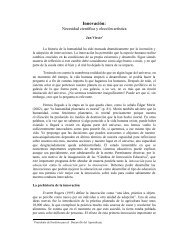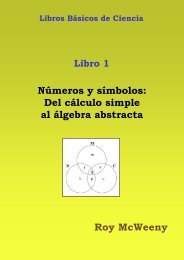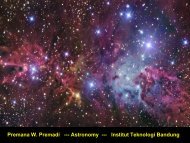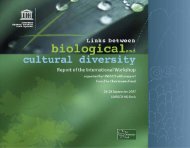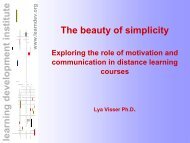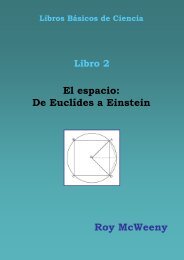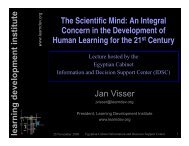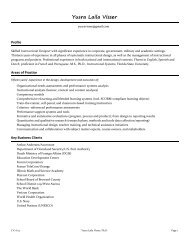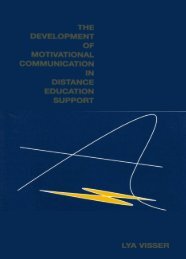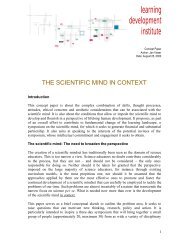The planet we live on: The beginnings of the Earth Sciences
The planet we live on: The beginnings of the Earth Sciences
The planet we live on: The beginnings of the Earth Sciences
- No tags were found...
You also want an ePaper? Increase the reach of your titles
YUMPU automatically turns print PDFs into web optimized ePapers that Google loves.
An example <strong>of</strong> this is investigati<strong>on</strong>s into <strong>the</strong> extincti<strong>on</strong> <strong>of</strong> <strong>the</strong> dinosaurs and o<strong>the</strong>r majorextincti<strong>on</strong>s <strong>of</strong> <strong>the</strong> past. At <strong>the</strong> moment, <strong>the</strong>re are two main competing <strong>the</strong>ories to accountfor mass extincti<strong>on</strong>s. Some scientists argue for an ‘impact <strong>the</strong>ory’, where an asteroid hit<strong>the</strong> <strong>Earth</strong>, causing a massive impact, tsunamis, wildfires, and thick clouds <strong>of</strong> dust thathid <strong>the</strong> sun, killing <strong>the</strong> vegetati<strong>on</strong> and most <strong>of</strong> <strong>the</strong> animals that <str<strong>on</strong>g>live</str<strong>on</strong>g>d <strong>on</strong> <strong>the</strong> vegetati<strong>on</strong>.O<strong>the</strong>r geoscientists argue that <strong>the</strong> extincti<strong>on</strong>s are c<strong>on</strong>nected with massive outpourings<strong>of</strong> lava, producing volcanic gases and ash, that transformed <strong>the</strong> climate <strong>of</strong> <strong>the</strong> <strong>Earth</strong>,affecting all life. Still o<strong>the</strong>rs argue that <strong>the</strong> extincti<strong>on</strong>s might have been caused by acombinati<strong>on</strong> <strong>of</strong> events, including <strong>the</strong>se, or that some extincti<strong>on</strong>s had <strong>on</strong>e cause whileo<strong>the</strong>rs had different causes. <str<strong>on</strong>g>The</str<strong>on</strong>g> <strong>on</strong>ly way <strong>of</strong> deciding which <strong>of</strong> <strong>the</strong>se ideas is <strong>the</strong> mostlikely, is to collect more evidence, similar to that already collected from many parts <strong>of</strong> <strong>the</strong><strong>Earth</strong> including, geological evidence <strong>of</strong> lavas and impacts, geophysical evidence <strong>of</strong> impactcraters, geochemical evidence from sediments, fossil evidence <strong>of</strong> species present before andafter extincti<strong>on</strong>s, and detailed logging <strong>of</strong> geological sequences at <strong>the</strong> times <strong>of</strong> <strong>the</strong> <strong>Earth</strong>’smajor extincti<strong>on</strong> events. What will <strong>the</strong> ans<str<strong>on</strong>g>we</str<strong>on</strong>g>r(s) be? If you become a geologist, youmight help to find out.Some people might complain that it is not worth researching major extincti<strong>on</strong>s in <strong>the</strong>distant geological past, but whatever <str<strong>on</strong>g>we</str<strong>on</strong>g> find out about ancient extincti<strong>on</strong>s, might help usto understand how species become extinct today, toge<strong>the</strong>r with <strong>the</strong> impacts that climatechange might have <strong>on</strong> future extincti<strong>on</strong>s. So geologists c<strong>on</strong>tribute not <strong>on</strong>ly to debatesabout <strong>the</strong> past, but also to discussi<strong>on</strong>s <strong>on</strong> what is happening <strong>on</strong> our <str<strong>on</strong>g>planet</str<strong>on</strong>g> today, andwhat might happen in <strong>the</strong> future.<str<strong>on</strong>g>The</str<strong>on</strong>g> world <strong>of</strong> academic research is changing because most <strong>of</strong> <strong>the</strong> funding for researchcomes from large nati<strong>on</strong>al organisati<strong>on</strong>s such as government councils or charities. Researchscientists have to put in bids for funds to run <strong>the</strong>ir research programmes, <strong>the</strong>se are‘peer revie<str<strong>on</strong>g>we</str<strong>on</strong>g>d’ and <strong>the</strong> successful bids get funding. Most successful bids are submittedby research groups <strong>of</strong> several scientists and much <strong>of</strong> <strong>the</strong> actual work is d<strong>on</strong>e by researchstudents. Even though quite a lot <strong>of</strong> <strong>the</strong> work involves high technology, using expensivemachines and computers, geoscience informati<strong>on</strong> still needs to be collected from <strong>the</strong>ground, with fieldwork and field data collecti<strong>on</strong> being key parts <strong>of</strong> <strong>the</strong> job. <str<strong>on</strong>g>The</str<strong>on</strong>g> result <strong>of</strong>all this is that few research scientists now work al<strong>on</strong>e and good team work is vital (Figure6.16). It is also vital that research scientists communicate <strong>the</strong>ir work to <strong>the</strong>ir colleaguesand to <strong>the</strong> public, showing that today’s research scientists need to play a wide range <strong>of</strong>different roles if <strong>the</strong>y are to be successful.Since university geologists not <strong>on</strong>ly carry out research, but also teach <strong>on</strong> university courses,new students learn how to become future geologists and also how to become researchscientists. With <strong>the</strong> past, present and future to investigate, research geoscientists willalways play a crucial role in studying and c<strong>on</strong>tributing to how our <str<strong>on</strong>g>planet</str<strong>on</strong>g> evolves in <strong>the</strong>future.Studying geoscience can <strong>of</strong>fer a <str<strong>on</strong>g>we</str<strong>on</strong>g>alth <strong>of</strong> opportunities, both in <strong>the</strong> commercial andresearch fields. It also provides a sound foundati<strong>on</strong> for people to move into lots <strong>of</strong> differentjobs, with geologists playing important roles in government, law, educati<strong>on</strong>, media anda wide range <strong>of</strong> commercial positi<strong>on</strong>s. A number <strong>of</strong> <str<strong>on</strong>g>we</str<strong>on</strong>g>bsites c<strong>on</strong>tain more details <strong>of</strong>148



